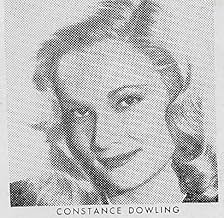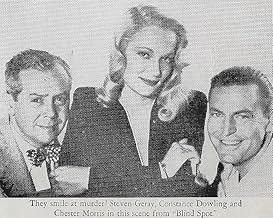AVALIAÇÃO DA IMDb
6,5/10
229
SUA AVALIAÇÃO
Adicionar um enredo no seu idiomaA mystery writer accused of murdering his publisher sets out to discover the real killer.A mystery writer accused of murdering his publisher sets out to discover the real killer.A mystery writer accused of murdering his publisher sets out to discover the real killer.
- Direção
- Roteiristas
- Artistas
Steve Benton
- Stakeout Detective - Jeff's Apartment
- (não creditado)
Paul Bryar
- Police Officer Harmon
- (não creditado)
Jimmy Gray
- Stakeout Detective - Jeff's Apartment
- (não creditado)
Robert Hartford
- Policeman
- (não creditado)
Charles Jordan
- Cab Driver
- (não creditado)
Frank Mayo
- Police Doctor
- (não creditado)
Brian O'Hara
- Desk Sergeant
- (não creditado)
- Direção
- Roteiristas
- Elenco e equipe completos
- Produção, bilheteria e muito mais no IMDbPro
Avaliações em destaque
While there is an obvious borrowing from The Kennel Murder Case, Chester Morris does an excellent performance as the author-on-a-bender who might have murdered his publisher. Morris' character, who is identified as a novelist who writes intellectual psychological stories, speaks more like noir style detective.
The story is a locked room murder supposedly carried out by Morris who devised the idea, but he can't remember how the murderer did it. And no matter what Morris does to try and remember his solution the more it looks like he did it.
Blind Spot is an entertaining whodunit with a supporting cast of well-known character actors. This is a film to enjoy on a rainy night or while being stuck at home during a winter storm. I came across this film on Hastings Mystery Theater on YouTube, and I was surprised at how good it was as a B+ B movie.
The story is a locked room murder supposedly carried out by Morris who devised the idea, but he can't remember how the murderer did it. And no matter what Morris does to try and remember his solution the more it looks like he did it.
Blind Spot is an entertaining whodunit with a supporting cast of well-known character actors. This is a film to enjoy on a rainy night or while being stuck at home during a winter storm. I came across this film on Hastings Mystery Theater on YouTube, and I was surprised at how good it was as a B+ B movie.
Like Decoy, this distinctive low-budget noir has fallen through the cracks and deserves resurrection. It's another masterly essay in irony from the pen of Martin Goldsmith of Detour fame. The plot involves a desperate, alcoholic writer who sarcastically pitches a "locked room" murder mystery to his publisher, then sees the plot occur in real life (with himself as chief suspect, of course). Despite the lack of his presence in the credits, Cornell Woolrich's novels are an obvious influence here - themes of urban paranoia, loss of memory, disconnected characters, etc, were his stock-in-trade. The ripe dialogue borders on self-parody, and the entire exercise could have easily been directed as a satire of the genre. Instead it becomes a double-density noir. Morris and Geray are rather miscast, but peek-a-boo blonde Dowling is striking (particularly visually) as a potential femme fatale. The moody cinematography is engagingly oppressive, lingering on beads of sweat and trapping us in confined spaces. Director Robert Gordon worked mainly in TV and never had much success in film. The "locked room" mystery, a staple of the detective novel genre, was most memorably committed to celluloid in the early talkie classic The Kennel Murder Case.
This film is a must for fans of noir and b-movies. The hero is a semi-alcoholic writer, wrongly accused of a murder committed while he was drunk.
The actor plays this drunk so obnoxiously that he will have you cringing in your seat, begging for him to finally pass out. It's the acting equivalent of fingernails on a chalk board. What saves the movie and makes it worth seeing are the incredibly over-the-top lines the writer cooked up.
These include: "the heat sapped my vitality like ten thousand blood-thirsty dwarves," "a ghost-writer is like drugs," "plagiarism is inscribing my name on another man's pen," and "when I want poetry, I read Walt Whitman."
Good for a laugh.
The actor plays this drunk so obnoxiously that he will have you cringing in your seat, begging for him to finally pass out. It's the acting equivalent of fingernails on a chalk board. What saves the movie and makes it worth seeing are the incredibly over-the-top lines the writer cooked up.
These include: "the heat sapped my vitality like ten thousand blood-thirsty dwarves," "a ghost-writer is like drugs," "plagiarism is inscribing my name on another man's pen," and "when I want poetry, I read Walt Whitman."
Good for a laugh.
This film has poor production values, but the script is not one of them; it is engrossing. I had bad vibes in the first ten minutes of this film because Chester Morris did such a horrible job playing a drunk. He recovers, however, and finally becomes the tough guy he was known for in similar films.
The plot centers upon a writer who may have killed his publisher (how many thousand suspects could that bring?). There is, of course, the romantic interest, the innocent? Blond who was the secretary of the publisher, a gentle detective story writer who was a friend of the publisher, and a bartender, as well as an elevator operator.
There is also a not-to-bright detective working on the case, who is very good at jumping to conclusions and sniffing red herrings.
The film is both entertaining and amusing at the same time and worth viewing from a mystery standpoint.
The plot centers upon a writer who may have killed his publisher (how many thousand suspects could that bring?). There is, of course, the romantic interest, the innocent? Blond who was the secretary of the publisher, a gentle detective story writer who was a friend of the publisher, and a bartender, as well as an elevator operator.
There is also a not-to-bright detective working on the case, who is very good at jumping to conclusions and sniffing red herrings.
The film is both entertaining and amusing at the same time and worth viewing from a mystery standpoint.
A hoary locked-room murder mystery retooled in full noir trim for the post-war era, Blind Spot sports the grungy, wrong-side-of-the tracks look of early, low-budget entries in the noir cycle, like Suspense and Fall Guy and The Guilty. It compensates (or overcompensates) with hopped-up performances and some particularly gaudy patter (`a 45-caliber toothache').
A clutch of his books is the only mark of achievement in mystery-writer Chester Morris' squalid basement apartment; he's on the losing end of an extortionate contract drawn up by his publisher (William Forrest). Before heading uptown to confront him, Morris swigs some false courage from the heel of a bottle, telling himself `It isn't easy to beg money from a man you'd rather kick in the teeth.' Nor is it such a good idea to ask for favors reeking of booze and with a couple days worth of beard stubble, but he charges ahead anyway.
Morris muscles past the Veronica-Lake-ish secretary (Constance Dowling) to barge into Forrest's office, where the publisher is playing carpet golf with one of his successful authors (Steven Geray). Barely coherent, Morris claims that even drunk he can dream up a top-notch plot, and begins to pitch his locked-room mystery before he's shown the door. Down in the ground-floor bar, he continues recounting his story idea to the heard-it-all bartender (Sid Tomack), when he's joined by a suddenly fascinated Dowling.
Next morning, the police arrest Morris for the murder of Forrest, who was found dead in his office, bolted from within. Of course, he's lost the whole evening in a blackout. Curiously, two unlikely advocates rally to his side Geray, who praises the psychological realism of Morris' writing, and Dowling, whose motives remain murkier (gal pal or femme fatale?). Circumstances take an even darker turn when the bartender, too, is found murdered in his bed....
Blind Spot feels a lot like a Cornell Woolrich knockoff (writers, blackouts, homicides), yet it's not quite cheesy. (The script reveals itself to be a keen student of the not-yet-identified noir cycle, with a couple of Hollywood in-jokes, including a veiled reference to The Lost Weekend.) Morris made the movie as a break from the 40s programmers which are his chief claim to fame, the Boston Blackie series, after which his career swiftly petered out. His biography includes one arresting detail, however: `In 1951, Morris received the deathbed confession of his friend Roland West for the murder of actress Thelma Todd in 1935.' Sounds like the beginning of another Boston Blackie script.
A clutch of his books is the only mark of achievement in mystery-writer Chester Morris' squalid basement apartment; he's on the losing end of an extortionate contract drawn up by his publisher (William Forrest). Before heading uptown to confront him, Morris swigs some false courage from the heel of a bottle, telling himself `It isn't easy to beg money from a man you'd rather kick in the teeth.' Nor is it such a good idea to ask for favors reeking of booze and with a couple days worth of beard stubble, but he charges ahead anyway.
Morris muscles past the Veronica-Lake-ish secretary (Constance Dowling) to barge into Forrest's office, where the publisher is playing carpet golf with one of his successful authors (Steven Geray). Barely coherent, Morris claims that even drunk he can dream up a top-notch plot, and begins to pitch his locked-room mystery before he's shown the door. Down in the ground-floor bar, he continues recounting his story idea to the heard-it-all bartender (Sid Tomack), when he's joined by a suddenly fascinated Dowling.
Next morning, the police arrest Morris for the murder of Forrest, who was found dead in his office, bolted from within. Of course, he's lost the whole evening in a blackout. Curiously, two unlikely advocates rally to his side Geray, who praises the psychological realism of Morris' writing, and Dowling, whose motives remain murkier (gal pal or femme fatale?). Circumstances take an even darker turn when the bartender, too, is found murdered in his bed....
Blind Spot feels a lot like a Cornell Woolrich knockoff (writers, blackouts, homicides), yet it's not quite cheesy. (The script reveals itself to be a keen student of the not-yet-identified noir cycle, with a couple of Hollywood in-jokes, including a veiled reference to The Lost Weekend.) Morris made the movie as a break from the 40s programmers which are his chief claim to fame, the Boston Blackie series, after which his career swiftly petered out. His biography includes one arresting detail, however: `In 1951, Morris received the deathbed confession of his friend Roland West for the murder of actress Thelma Todd in 1935.' Sounds like the beginning of another Boston Blackie script.
Você sabia?
- ConexõesReferenced in Noir Alley: Repeat Performance (2019)
Principais escolhas
Faça login para avaliar e ver a lista de recomendações personalizadas
Detalhes
- Tempo de duração
- 1 h 13 min(73 min)
- Cor
- Proporção
- 1.37 : 1
Contribua para esta página
Sugerir uma alteração ou adicionar conteúdo ausente















